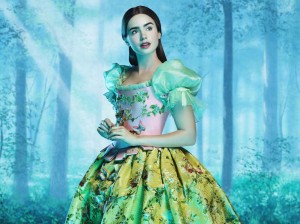
Mirror Mirror was directed, shot and produced by the same creative team that delivered The Immortals to audiences last year, and the design of the production-through-final color workflow had been developed for that earlier project. Like its predecessor, Mirror Mirror had a number of complex visual elements to manage and with the experience gained on The Immortals, this guaranteed a fast turnaround. The Film Factory’s process is centered on the Nucoda Film Master, which marries an on-set system to the final color pass. The Film Master system, which included a SAN and Nucoda Fuse assist station, was installed on set in Montreal. From the set, Kopp did a grading pass of the Sony F35 dailies, which were then sent to the editing room with the color settings. In some cases, a further grading took place prior to dailies screening in the DI suite with director and crew. Designing this system meant that the dailies – from the set through screening and ultimately delivery – were kept in a closely matched, carefully monitored environment. As he did for The Immortals, Kopp graded every take from the first day of dailies through completion of the DI.
“Building the infrastructure frees me and the director to concentrate on what we really want to do, and that is to create something beautiful,” said Kopp. “This workflow allowed the artistic process to go on through the entire course of the project, not just at the end. It was all about the color palette and choosing visuals that we wanted in the story. If you have to worry about how the pipeline is going to work, that takes time away from what is important. Nucoda has freed us from those concerns.”
In addition to dailies and preparing for the DI, there were previews of the film, which were graded and screened for preview audiences. When audience comments came in, the notes were incorporated into the process and considered for the final DI grade. Working in the Nucoda facilitated easy export for those previews.
“From our experience on The Immortals, we were ready and comfortable to go through the process a second time,” said Film Factory colorist Marc Boucrot. “That was important, since the time frame for Mirror Mirror was significantly compressed, and there were previews to incorporate. With four months from beginning to end, there was simply no time for missteps and confusion in the pipeline. The Nucoda was a critical piece of our success in this project.”
There were nearly 1,300 visual effects shots in the movie, and according to Kopp, “The Nucoda enabled us to have one central hub, where dailies color settings, visual effects and eventually the DI was managed. There were vendors from all over the world, but the VFX supervisor, Tom Wood, was in house with us in Montreal during the shoot, and in the postproduction building at Wildfire Studios in Los Angeles where editing, sound editing and mixing, and DI rooms were all together. As shots came in, we were able to look at them in the DI rooms and see how they were working. The ability to have all of these activities going on in one location, our facility, was crucial given the time frame and the visual style of the movie.”
“Keeping the process in house was important,” Kopp added. “Helping Tarsem execute his vision for Mirror Mirror was our first priority. Every project we undertake is an artistic and technical process, and we plan and execute how to do that in the best way, from day one to the final delivery. We want to be efficient, creative, and enable filmmakers to tell the story they set out to tell.”





